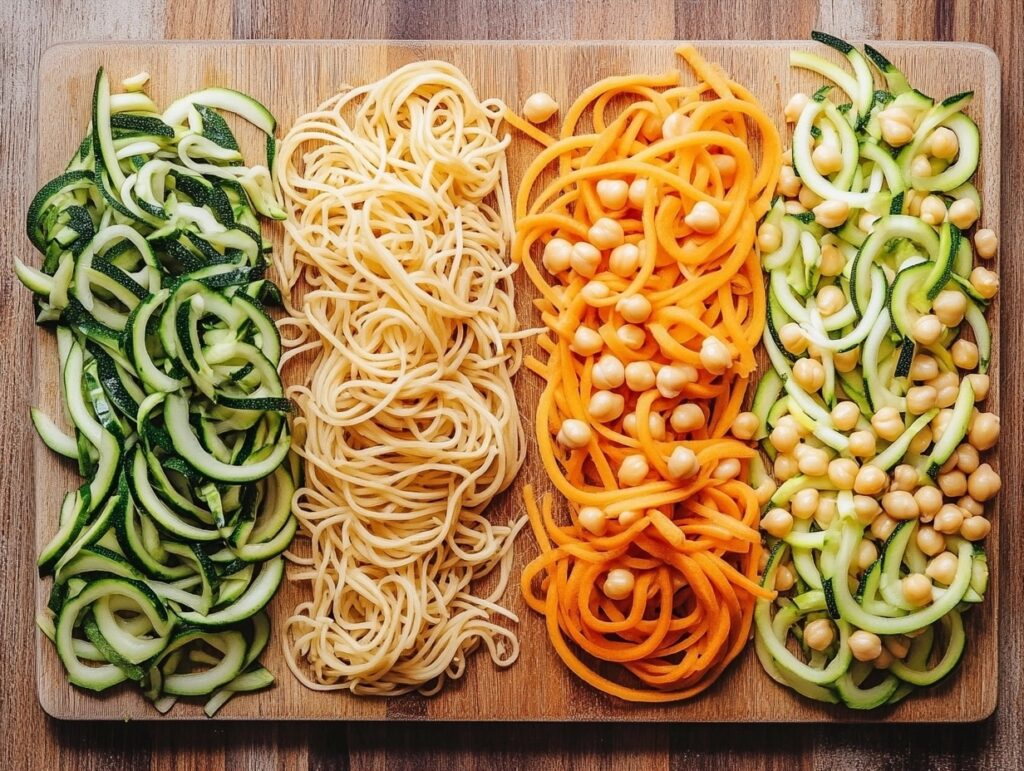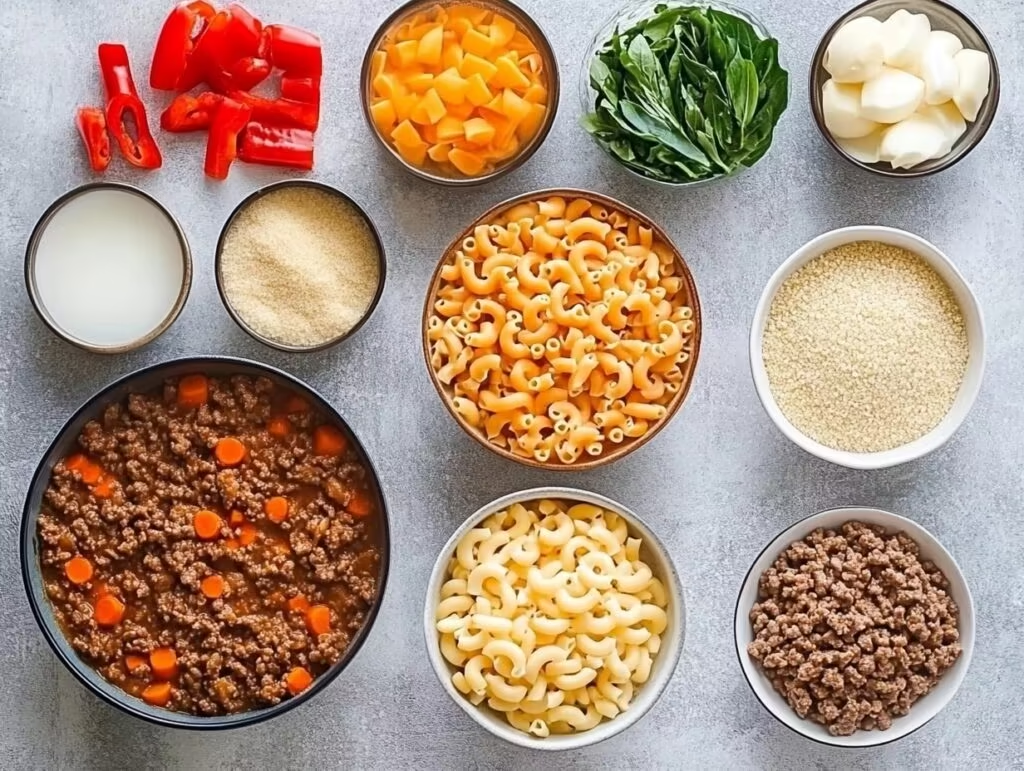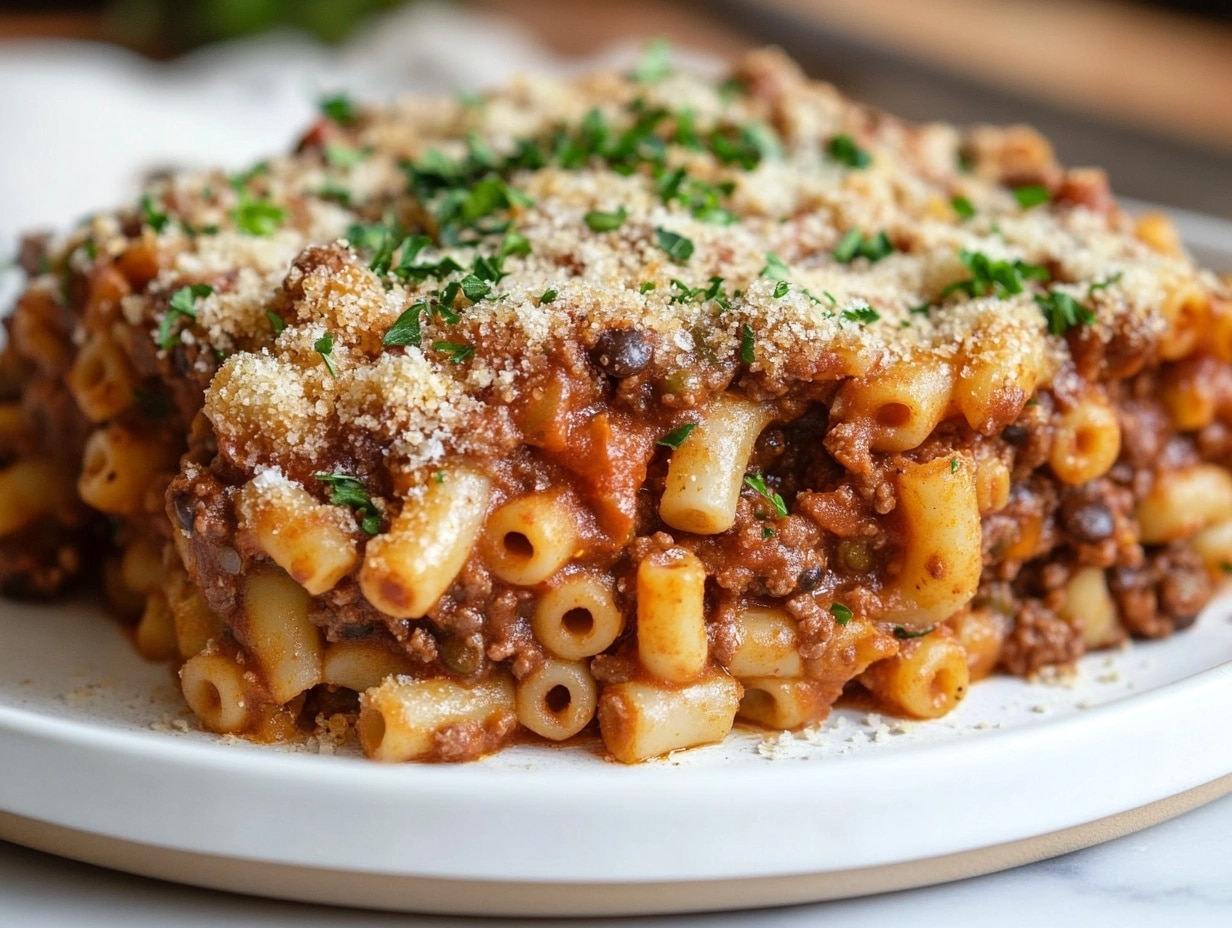Beefaroni is a classic comfort food loved by many, but is beefaroni unhealthy? This question pops up often, especially as more people become health-conscious. Let’s break down its nutrition, ingredients, and ways to make it a healthier choice
Table of contents
Understanding Beefaroni: Ingredients and Origins
Beefaroni is a favorite for busy families, kids, and anyone who loves quick and filling meals. But what exactly is beefaroni, and how did it become so popular?
What is Beefaroni?
Beefaroni is a simple pasta dish made with macaroni, ground beef, and a rich tomato sauce. Some recipes add cheese for extra flavor, while others keep it light and easy. You’ve likely seen it as a canned meal or made fresh at home.
Fun fact: The dish gained fame thanks to Chef Boyardee, who introduced a canned version in the 1960s. Since then, it’s been a go-to comfort food.
Traditional Ingredients of Beefaroni
The typical ingredients in beefaroni are pretty straightforward:
| Ingredient | Role in the Dish |
|---|---|
| Elbow macaroni | The pasta that forms the base |
| Ground beef | Adds protein and flavor |
| Tomato sauce | Makes it saucy and savory |
| Cheese (optional) | Gives it a creamy texture |
| Spices (like oregano) | Enhances the overall taste |
Nutritional Analysis of Beefaroni

Before deciding if beefaroni is bad for you, let’s take a closer look at its nutrition.
Calories in Beefaroni: How Does it Compare?
One serving of canned beefaroni (about 1 cup) has 250–300 calories. If you’re making it at home, the calorie count may go up, especially if you use lots of cheese or butter.
Protein, Fat, and Carbs in Beefaroni
Here’s what a typical cup of beefaroni contains:
| Nutrient | Amount | What It Means |
|---|---|---|
| Protein | 8–12g | Helps build and repair muscles |
| Fat | 8–10g | Provides energy but can add up |
| Carbs | 30–35g | Fuels your body but watch the portion |
While it offers protein, carbs, and fat can quickly add to your daily intake if you eat more than one serving.
Why Sodium in Canned Beefaroni is a Concern
Sodium is a big issue with canned versions. One cup often has over 800mg of salt—more than 30% of your daily limit! Too much salt can lead to health problems like high blood pressure.
Block Quote:
“Reducing salt in your diet, even a little, can make a big difference for your heart and overall health.”
Common Health Concerns Associated with Beefaroni
To fully answer the question, “Is beefaroni unhealthy?” we must address some common health concerns tied to the dish.
High Sodium Content
One of the main issues is sodium. Canned beefaroni often contains over 800mg of sodium per serving. This high salt content can contribute to high blood pressure. But is beefaroni unhealthy if you make it from scratch? Not necessarily! Homemade versions can cut the sodium by using fresh ingredients.
Processed Ingredients
Another reason people ask, “Is beefaroni unhealthy?” is the use of preservatives and artificial flavors in canned varieties. Eating these in large amounts may not align with a healthy diet. Switching to a homemade version allows you to skip unnecessary additives.
Can Beefaroni Fit Into a Healthy Diet?
Good news—it can! Here’s how to enjoy beefaroni while keeping it healthy.
Stick to a single-serving
It’s all about portion control. Measure out one cup and avoid going back for seconds. Pair it with veggies or a side salad to feel fuller without adding too many extra calories.
Add More Vegetables
Boost the dish’s nutrition by mixing in veggies like spinach, bell peppers, or zucchini. Not only do they make the dish healthier, but they also add flavor and crunch.
Make It Yourself
Homemade beefaroni gives you control over what goes into it. Use lean beef, whole-grain pasta, and low-sodium tomato sauce for a healthier version.
💡 Pro Tip: Want a healthier twist? Try swapping regular pasta with chickpea pasta or spiralized zucchini for fewer carbs and more nutrients.
Alternatives to Traditional Beefaroni
If you’re a fan of beefaroni but want healthier options, don’t worry! There are plenty of creative ways to enjoy this dish without compromising your health. Let’s explore some exciting alternatives.
Gluten-Free Beefaroni Options
If you’re avoiding gluten, traditional pasta may be off the table. Luckily, gluten-free options like rice pasta, quinoa pasta, or chickpea pasta work just as well. These alternatives are rich in fiber and often lower in calories.
| Pasta Type | Benefits |
|---|---|
| Rice pasta | Gentle on digestion |
| Chickpea pasta | High in protein and fiber |
| Quinoa pasta | Packed with nutrients like magnesium |
By using these substitutes, you can still enjoy a comforting bowl of beefaroni without worrying about gluten.
Plant-Based Beefaroni Recipes

For vegetarians or those cutting back on meat, plant-based beefaroni is a tasty and satisfying choice. Swap out ground beef for lentils, mushrooms, or textured vegetable protein (TVP). These options mimic the texture of beef while adding a boost of fiber and nutrients.
Here’s a simple idea:
- Use whole-grain pasta.
- Make a rich tomato sauce with diced tomatoes, onions, and garlic.
- Stir in cooked lentils or crumbled tofu for protein.
- Add nutritional yeast for a cheesy flavor without the dairy.
Lower-Calorie Variants of Beefaroni
Watching your calorie intake? Try these tweaks to make your beefaroni lighter:
- Use lean ground turkey or chicken instead of beef.
- Opt for zoodles (zucchini noodles) instead of macaroni.
- Replace full-fat cheese with a sprinkle of Parmesan or skip it entirely.
Block Quote:
“Small changes, like swapping regular pasta for spiralized veggies, can slash calories without sacrificing taste.”
Practical Tips for Enjoying Beefaroni Healthily
Let’s face it, beefaroni can be tempting. But with a little planning, you can enjoy it in a way that works for your health.
Balancing Beefaroni in Your Weekly Diet
Think of beefaroni as an occasional treat rather than a staple meal. Balance it out by including plenty of fresh fruits, vegetables, and lean proteins in your weekly menu.
For example:
- Monday: Grilled chicken and veggies.
- Tuesday: Beefaroni with a side salad.
- Wednesday: Baked salmon with quinoa.
Recipes for Healthier Beefaroni Versions
Making beefaroni from scratch is easier than you think! Here’s a quick recipe for a healthier version:
Homemade Healthy Beefaroni Recipe
| Ingredient | Amount |
|---|---|
| Whole-grain macaroni | 2 cups (cooked) |
| Lean ground turkey | 1 pound |
| Tomato sauce (low sodium) | 1 cup |
| Diced tomatoes | 1 cup |
| Spinach (chopped) | 1 cup |
| Parmesan cheese | 2 tbsp (optional) |
| Garlic and oregano | To taste |
- Cook the pasta according to package instructions.
- In a skillet, cook the ground turkey until browned.
- Add tomato sauce, diced tomatoes, garlic, and oregano. Simmer for 10 minutes.
- Stir in spinach and cooked macaroni. Top with Parmesan if desired.
- Serve and enjoy!
Shopping Tips: Choosing Better Canned Options
If you’re in a rush and need to grab canned beefaroni, here’s how to make the best choice:
- Look for labels that say “low sodium” or “no added salt.”
- Check for simple ingredient lists without artificial additives.
- Pick brands that use whole-grain pasta or organic ingredients.
Addressing Misconceptions About Beefaroni
Many people assume beefaroni is pure junk food, but that’s not entirely true. Let’s bust some myths.
Is Beefaroni Really “Junk Food”?
Beefaroni isn’t inherently bad. Like most foods, it’s all about how it’s made and how often you eat it. Homemade beefaroni with quality ingredients can be a balanced meal.
Understanding Marketing Myths Around Convenience Foods
Canned and packaged foods often get a bad rap. While they aren’t as fresh as homemade meals, they can still be part of a balanced diet when chosen carefully. Brands may use buzzwords like “natural” or “healthy,” but it’s important to read the ingredient list and nutritional facts.
How to Identify Quality Products on the Market
Want to make smarter choices? Look for products with fewer than five ingredients, low sodium, and whole-grain pasta. These are indicators of a healthier option.
Final Verdict: Is Beefaroni Unhealthy?
So, is beefaroni unhealthy? It depends on how it’s made and how often you eat it.
Balancing Taste and Nutrition
Beefaroni can be part of a healthy diet if you focus on balance. Pair it with veggies, watch your portions, and avoid eating it too often.
Making Informed Dietary Choices
The key to enjoying beefaroni without guilt is knowing what’s in it. Homemade versions allow you to skip unhealthy additives and control the salt, fat, and calories.
Why Moderation is Key
At the end of the day, moderation is everything. Enjoy beefaroni as a comfort meal now and then, but remember to keep it balanced with plenty of wholesome foods.
FAQs About Beefaroni and Health
Here are some common questions about beefaroni and its impact on health. These answers will help you make better choices and understand the dish better.
Can kids eat beefaroni safely?
Yes, kids can eat beefaroni in moderation. It’s a convenient option for busy days, but it’s best to serve smaller portions and pair them with veggies to make it a more balanced meal. Homemade versions are especially good since you can reduce sodium and skip additives.
How often should you eat beefaroni?
Beefaroni is fine as an occasional treat. Eating it once or twice a month as part of a balanced diet won’t harm your health. However, regularly eating processed versions may lead to higher sodium and fat intake, so it’s better to enjoy it less frequently.
What are the best ways to make beefaroni healthier?
There are many simple ways to improve the healthiness of beefaroni:
- Use whole-grain or gluten-free pasta.
- Choose lean ground meat or plant-based proteins.
- Add lots of veggies like spinach, zucchini, or carrots.
- Opt for low-sodium tomato sauce.
- Make it at home to control all the ingredients.
Are there any vegan alternatives to beefaroni?
Absolutely! Vegan beefaroni swaps out meat and dairy for plant-based options. Try lentils, crumbled tofu, or mushrooms for the “meaty” component. Nutritional yeast or vegan cheese can replace traditional cheese. Combine these with whole-grain pasta and a flavorful tomato sauce for a delicious dish.
How does beefaroni compare to other pasta dishes nutritionally?
Beefaroni is similar to other pasta dishes like spaghetti bolognese or lasagna in terms of calories and macronutrients. The biggest difference is in sodium content. Canned beefaroni tends to have much more salt, making homemade versions a healthier choice.
What should I watch for when buying canned beefaroni?
Here’s what to check:
- Sodium content: Look for cans with 600mg of sodium or less per serving.
- Ingredients: Avoid brands with long lists of artificial additives.
- Serving size: Stick to one cup to avoid overeating.
Conclusion
Beefaroni doesn’t have to be an unhealthy indulgence. Like any food, it’s all about balance, quality, and portion control. By choosing healthier versions, adding veggies, or making it from scratch, you can enjoy this comfort food guilt-free.
Remember, the key to a healthy diet isn’t about avoiding certain foods altogether—it’s about making mindful choices and enjoying everything in moderation. Beefaroni can easily be part of a happy, healthy life when approached with the right mindset.
For more ideas and comparisons, read What’s the Difference Between Beefaroni and Spaghetti?.

